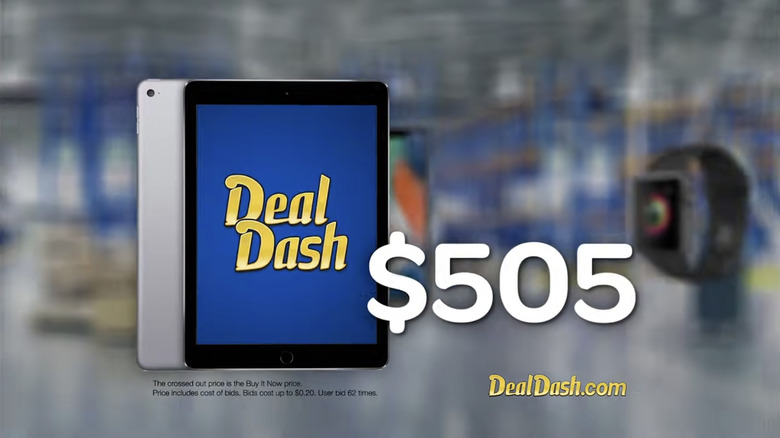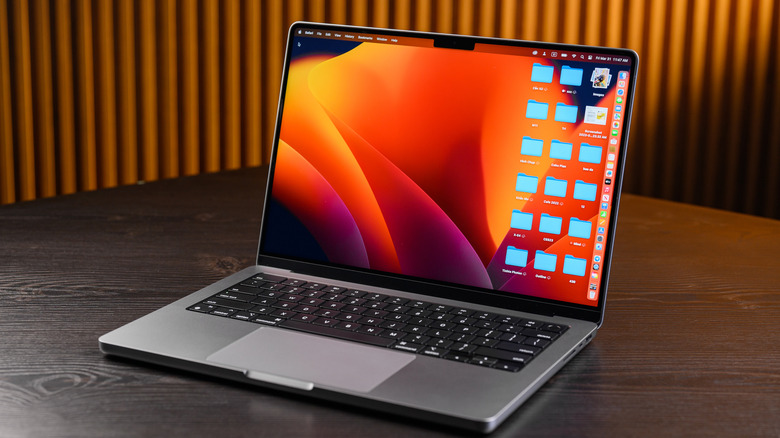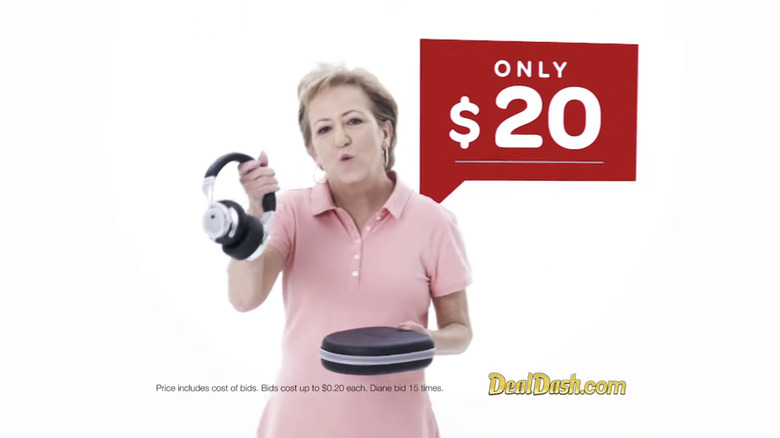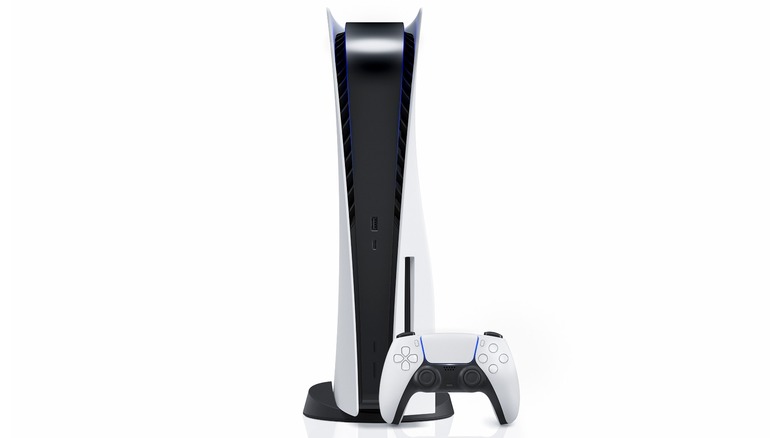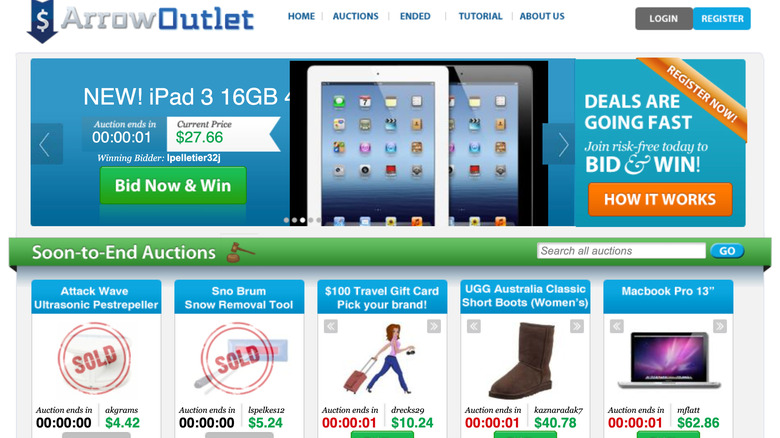DealDash: Are They Real Prices? Or Just Another Big Scam?
If you still watch linear, traditional television, then you've probably seen commercials for DealDash.com. Billed as "The Fair and Honest Bidding Site," its commercials tout the ridiculous deals that it says its users have managed to snag, deals that sound too good to be true. Though DealDash does not appear to have posted any new TV commercials on its YouTube channels in the last few years, this one from 2018 still illustrates what's airing now.
"I got this mountain bike for only $11," exclaims a man appearing onscreen with his bike to open the spot. "An iPad worth $505 was sold for less than $24. A PlayStation 4 for less than $16, and a Schultz 4K television for less than $2." It continues from there, with many of the products also displaying the "buy it now" price that showed the level of savings each buyer achieved.
However, there's also fine print throughout. "Price includes the cost of bids," reads the fine print during the opening about the mountain bike. "Bids cost up to $0.20 each. Zachary bid 17 times." And that iPad? In addition to explaining that "the crossed out price is the Buy It Now price" and what was explained about the bicycle, it's noted that the "[u]ser bid 62 times."
There's more than meets the eye here, and when online scams are so common, we all need to show caution. But how exactly does it work, and how cautious do you need to be about DealDash's pay-to-bid model?
How DealDash actually works
From the fine print in its TV commercials, you've probably gleaned some idea of how DealDash works. Everyone pays to bid, with each bid increasing the on-paper purchase price by one cent. Because everyone is paying to bid, theoretical deals are being subsidized by the bidders other than the winning bidder, and not just by bidding the price up. The act of bidding in and of itself is generating revenue. DealDash is also clear that if you don't win a given auction, buying the item from them at the "buy it now" price will result in your bids being returned.
In listing past winners on each item page, DealDash gives not just the final bid but also the estimated total cost, including paying for the bids and how many total bids were placed. Some cases where the winner didn't make out well are included, and the number of past winners shown varies wildly by the lot. It looks like DealDash is genuinely trying to provide a complete history of what was actually paid every time a given lot was sold.
DealDash isn't exactly hiding the real cost, but there are catches
It's not as if there's no transparency here. On the listing of a lot that bundles a base model M2 MacBook Pro, a pair of Schultz SQ4 earphones, and a Monolith Pioneer backpack, the "buy it now" price is exactly the combined retail price of $2,209. The most recent "winner" listed at the time of this writing is someone whose final bid was $729.32, but their estimated total cost was $2,804.12, meaning that they lost $595.12 (plus tax) compared to buying all three items at retail. The next-most-recent winning bidder, though, lucked into paying a total of just $311.80, but the previous winner also lost out vs. retail. All told, of the seven winners listed, four each spent not just more than retail but hundreds of dollars more.
The information is clear as day and prominently placed on the item pages. If nothing else, DealDash is not hiding that a lot of luck is involved in snagging good deals, and "winners" often pay much more than retail. That doesn't mean that there isn't anything to be cautious about, though.
Getting your bids back isn't quite as easy as it sounds
It does complicate the "get your bids back" policy, though, that the more attractive items are often bundled with less well-known items that the bidder may not have been eyeing. Maybe you want a MacBook Pro, but you just want a MacBook Pro and are only considering the other items in case you can snag the lot for less than the computer's $1,299 retail price. In that case, paying the "buy it now" price to get the bids back is a no-go because you don't want to spend an extra $910 for earphones and a backpack you didn't care much about.
As nice as it sounds in theory that you can get what you paid for bids back towards a purchase at the "buy it now" price, it's not nearly that simple in practice. If the PlayStation 5 and Xbox Series S consoles, Apple products, and other attractive items were sold on their own, that would be one thing, as you wouldn't be out any money compared to buying them at retail. But it's doubtful that most people interested in buying them at DealDash would want the specific bundled expensive accessories at their full price, so how many users are actually going to redeem their used bids?
Do DealDash items have warranties? Is DealDash even saying they do?
There's an often-overlooked area for electronics buyers where things can get dicey, as well: Do the products sold by DealDash come with full manufacturers' warranties that you'd expect to come from a large reseller? And is DealDash even promising that its products come with the manufacturers' warranties in the first place?
Let's answer the second question first: Yes and no. The description of the DealDash app in the Google Play Store as of this writing (archive here) lists one reason for using DealDash as follows: "Only brand new items with original manufacturer's warranty." However, DealDash's terms of use (archived here) don't make the same promise.
"DealDash does not manufacture or control any of the products or services offered on the Service," reads the relevant section of the terms. "The availability of products or services through the Service does not indicate an affiliation with or endorsement of any product, service or manufacturer. Accordingly, DealDash does not provide any warranties with respect to the products or services offered through the Service. However, the products and services offered through the Service may be covered by a manufacturer's warranty included with the product. To obtain warranty service for defective products, please follow the instructions included in the manufacturer's warranty."
This conflict renders the warranty status opaque at best, but it's even more complicated than what you just read.
The warranty issue gets even more complicated
Complicating the warranty issue is that some of the more attractive items at DealDash, like Apple products, only come with a full manufacturer's warranty if sold by an "authorized distributor." The way this works is that when there's a middleman who isn't an authorized distributor but buys an Apple product from an actual authorized reseller and sells it to you, the clock on the Apple warranty starts when the middleman buys it, not when you buy it.
When using Apple.com's authorized reseller search with DealDash's hometown of Minneapolis, Minnesota, provided as the location, DealDash does not show up in the results. So, at least on the surface, it appears that DealDash is not an authorized Apple distributor, which would mean that the one-year warranty started when DealDash bought its Apple products. This also means that you most likely won't be able to buy AppleCare for Apple items purchased at DealDash, as the customer has to buy AppleCare within 60 days of the original purchase date.
Sony's website, meanwhile, has a complete alphabetical authorized dealer listing that does not include DealDash. This brings up similar questions about the warranties on the PlayStation 5 consoles that the auction site sells.
As of this writing, DealDash has not responded to emails to its media relations account seeking clarification on whether its items come with manufacturers' warranties and/or if DealDash is an authorized reseller for any of the electronics brands it carries.
Didn't a site like DealDash get sued out of existence, though?
As you've been reading this article, you may have had your memory jogged a bit: Didn't one of the penny auction/pay-to-bid websites get effectively sued out of existence by some state attorneys general? Yes, but it was ArrowOutlet, not DealDash.
In January 2013, Washington State's Office of the Attorney General settled with the now-defunct website. "Arrow Outlet programmed 'bidbots,' software that runs – that cheats – automatically," said then-state AG Rob McKenna in a statement. "These programs created bogus bids that rigged results. And the bidbots sometimes won, allowing Arrow Outlet to walk away with all the bidders' money and the auction item." ArrowOutlet paid $85,000 in attorney's fees, penalties, and restitution, plus $35,000 suspended if they abided by the settlement.
In June 2014, then-Florida State Attorney General Pam Bondi reached her own settlement with ArrowOutlet for $425,000 in restitution. Eligible Florida customers had roughly two months to try to get paid by the restitution fund. These settlements were seemingly the beginning of the end of ArrowOutlet, as The Internet Archive's Wayback Machine has no ArrowOutlet archives of consequence past 2014.
Shortly after the second settlement, DealDash insisted to PC Mag that it does not use bid bots. It added that its site is audited annually by PricewaterhouseCoopers, with AlignCPA doing further audits. As of October 2023, the only mention of either auditor on DealDash.com is a May 2017 blog post that describes DealDash as "being regularly audited by PricewaterhouseCoopers."
To what degree is DealDash a scam?
So, all things considered, is DealDash a scam? It's complicated. If you consider all penny auction/pay-to-bid websites scams, then sure, it's a scam. But the reality is much more nuanced than that.
If nothing else, it's not a scam like ArrowOutlet was. There's no evidence that DealDash is using shill bidders, whether human or robotic, though that doesn't rule out actual human bidders using bots the same way they have for decades on eBay. DealDash also tries to be incredibly transparent about the retail prices of the items it sells and the actual cost to the bidders, even when it often shows the "winning" bidder paying more than the retail price.
That doesn't mean that there are no issues with DealDash, though. Its television commercials could certainly be more transparent, particularly outside of the fine print. In addition, as nice as the ability to get your used bids back to use towards buying the item at retail price sounds on paper, sticking the most popular items like Apple products and game consoles in bundles with other expensive items means that those unsuccessful bidders are a lot less likely to re-redeem those bids in practice. And even if you manage to snag a good deal, DealDash is incredibly opaque about whether or not the items will come with their original manufacturers' warranties.
In other words? DealDash is not necessarily a scam, but using the site brings some inherent risks with it.

